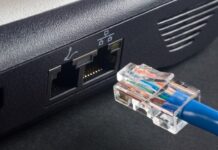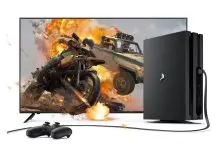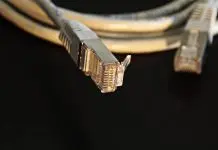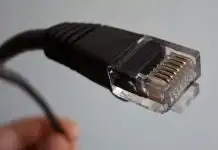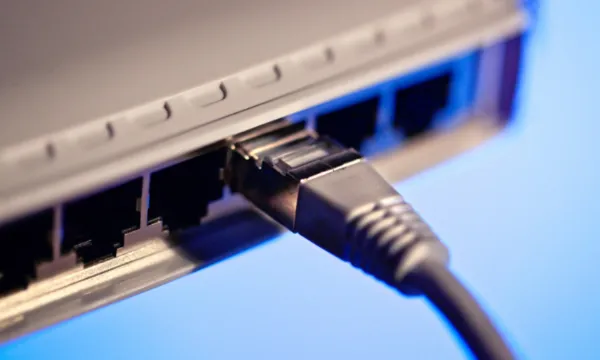
The screen resolution of smart TVs is evolving continuously. To reap the benefit of content produced in high-quality 1080p, 4K, UHD, etc., one needs to have seamless internet for their TV. The ability of smart TVs to run a wide range of apps and games also demands a fast internet connection.
Smart TVs can be connected to the internet in only 2 ways, via an Ethernet cable (LAN cable) or WiFi connection. The debate around Ethernet vs WiFi is old now. However, there are new and developing technological advancements in networking every year. That makes it tough to decide a better internet connection type for your TV.
In this article, we will examine which internet connection is more suited for your TV considering these factors:
- Set-Up
- Speed and reliability
- Saftey
- Convenience
Best Internet Connection For TVs: Ethernet Vs WiFi
Speed is not the only thing that makes a difference in deciding the best connection for your TV. Also, there are ifs and buts with the speed as well. Let us discuss 4 important things about Ethernet and WiFi to choose the winner.
Set-up

In most cases, your service provider does all the work. For wireless internet, you need to have a WiFi router that creates a wireless network with the help of a wired Ethernet connection attached to it. A lot of houses, apartments, and buildings are already equipped with WiFi.
There are now wireless routers available in the market which creates a wireless network using cellular data or other networks. You just have to enter the decided WiFi password on your TV and your set-up is complete.
Ethernet cable is also provided by the service provider. There are mostly two types of Ethernet cables being used for home connection currently – Cat5e, Cat6, and Cat 7 cables.
Ethernet cable is plugged into a router so that all the wireless devices in the home can receive the network. To connect your TV to the Internet, you will need another Ethernet cable that connects the router and your TV.
So, the set-up of WiFi, as well as Ethernet, is pretty easy. Almost the same equipment is required for both except you need an extra ethernet cable for an ethernet connection.
Speed And Reliability
This is the biggest deciding factor in choosing the type of internet connection for your TV. No doubt, Ethernet provides the fastest internet to your Television. The Cat5e type cable can theoretically provide you a speed of up to 1 Gigabit per second and the range of Cat6 cable can go around 10Gbps.
WiFi was very slow in comparison to Ethernet a few years ago. But after the change in the standard of WiFi from 802.11g to 802.11ac, WiFi is capable of providing a top speed of around 3200 Mbps.
The connection speed largely differs from provider to provider as well. Some WiFi network might deliver top speed and another ethernet provider might be delivering very low speed in the same area. You can check the internet speed of your connection on any browser using the internet speed tester.
If the service provider for both of your connection types is the same, then also Ethernet internet connection would be more suitable. Here are few reasons for that.
- Latency – Latency refers to the time taken by a signal traveling across the network. This is very low on wired connection as there is not much chance of interference. Latency in WiFi connections might be high at times impacting your viewing experience and mostly gaming.
- Bandwidth – Bandwidth is the amount of data that can be transferred across the network at a specific time. The wires of ethernet win here too. Even if there are multiple users on one ethernet connection, it provides a stable connection.
- Interference – As we said, Ethernet cables are not prone to interference from other networks to a large extent, WiFi connections highly suffer from that. It increases latency and signal strength can drop some time.
Safety
Experts trust more on wired networks as WiFi signal can be intercepted by hackers. But there are very few chances of that happening unless you really have something worthy of that much effort. In such a case, keep you updating your WiFi password frequently and use encryption methods like WPA2-PSK.
Convenience
What can be more convenient than a stable Wi-Fi connection? WiFi offers portability that allows you to use the internet on all your devices in any of your rooms depending on the range. To increase the range, you can pair them with good WiFi range extenders.
Ethernet on the other hand does not offer you such flexibility and your connected device has to be at a stationary position. But you do not need portability for TV anyway. So, in terms of convenience, both are equally good for TV.
Conclusion
Here is a quick summary of the comparisons we drew above between WiFi connection and Ethernet.
| Connection | Wi-Fi | Ethernet |
| Set-up | Easy | Easy |
| Speed | Good | Best |
| Convenience | Portable | Not portable |
| Bandwidth | Good | Best |
| Latency | Low | Lowest |
| Signal Interference | Yes | No |
| Safety | Depends on precautions | Safe |
So, You must have known by now that there is a considerable difference between these 2 connection types. WiFi offers you portability but Ethernet is good for the stability in terms of speed that a TV needs.
If you want to watch high-quality content or play live games, Ethernet provides a reliable connection. We would like to remind you again that your service provider also has a large role to play in the factors we discussed, especially the speed.

